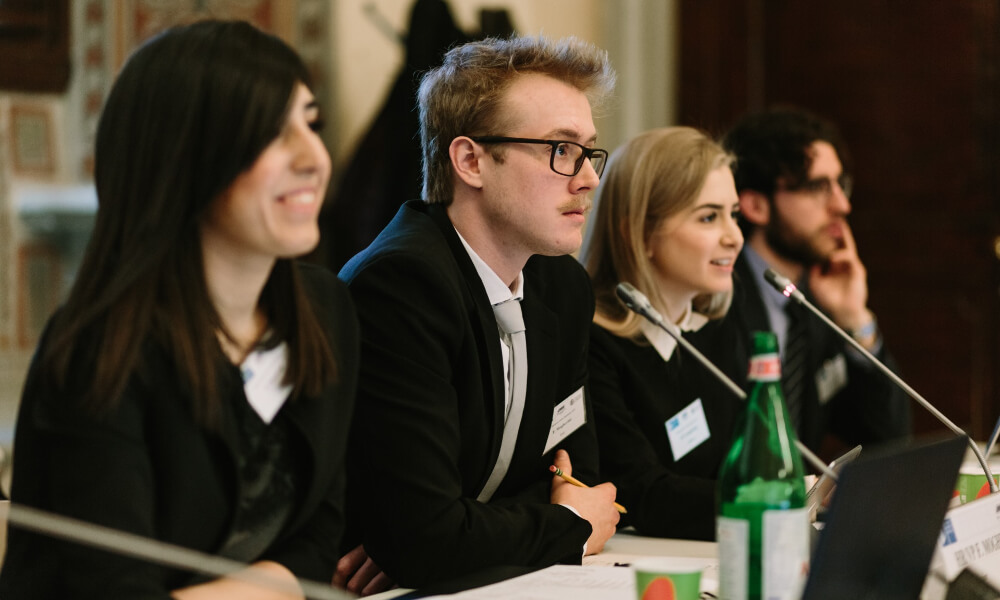Model EU Simulation
At a Glimpse
M.A. in Political Science, European Union Policy Studies
By Katherine Hayes
Partnering once again with graduate students at the Università degli Studi di Firenze (UNIFI), in March of 2019 EUPS students took once again to Villa Salviati for the annual Model European Union Simulation. With the official patronage of the European Parliament, granted this year by President Tajani, the simulation has acquired an additional diplomatic dimension.
Although the final simulation was only one day in duration, preparations for the event began in the previous fall. Students from JMU and UNIFI first joined together for team building activities in November and immediately began to familiarize themselves with the political documents, resolutions and draft materials necessary for the event, while they started training their presentation, public speaking and negotiation skills.
After a few months of individual research and document drafting work, preparations amped up throughout the week leading up to the simulation. EUPS professors Fergal Treanor and Iakovos Iakovidis held lectures on negotiation dynamics and skills. Dr. Iakovidis, a career diplomat, gave students an exclusive insider look at the nature of diplomatic negotiation.
In addition to the specific training offered by the EUPS professors, students had special access to hands-on negotiation training sessions with two longtime EU practitioners, Alex Stutzmann and Silvio Gonzato, who have been crucial over the last ten years in assisting with the drafting of national positions and policy documents while offering a unique look at the official positions of each country and institution represented at the simulation.
The 2018/19 simulation was modeled after the Council of Ministers and featured sixteen of the currently twenty-eight EU member states. Two students, generally one from JMU and one UNIFI, represented each selected country. In addition to each member state around the table, students played the roles of various European Commissioners, including the head of EU Foreign Policy, Federica Mogherini.
There were two issues on the simulation agenda. One addressed the unfolding situation in Venezuela, and the other focused on what type of EU action was necessary to combat increasing Russian aggression in Ukraine. The wide variety of national stances on both issues made for interesting and often intense debates throughout the day.
During coffee breaks and lunch, the negotiating didn’t cease. Students truly embraced their ministerial roles and were doing whatever they could to ensure a unanimous agreement was reached while the interest of their national government were still being respected.
At the end of the day, a compromise was eventually made. Language and provisions were edited to guarantee the best possible outcome for every member state at the negotiating table. Gonzato and Stutzmann praised the students’ efforts, noting that the simulation debates, organization and results get better each year.
As an EUPS student, this was an integral part of my experience in the program. In our coursework, we often discuss how the EU reaches decisions. The complex decision-making process can still be a challenge to conceptualize, though. This simulation provided an opportunity to see firsthand how negotiating works, to build my own negotiating skills, and to gain a larger respect for EU policymakers and their complex daily work. To work closely with practitioners, professors, and UNIFI peers is a unique aspect of the EUPS program and, as the latter continues to grow, it will also continue providing students with valuable experiences such as this one.
Katherine Hayes is a graduate of the EUPS class of 2019. She received her undergraduate degree from the University of Virginia in May 2018 with a double major in Foreign Affairs and Spanish.
